The right restaurant managers are the backbone of a successful dining experience. They oversee daily operations, manage staff, and ensure exceptional customer service, creating a welcoming environment that keeps guests coming back.
Skills for restaurant managers vary widely, encompassing leadership, organization, and problem-solving, as well as specific knowledge in areas like inventory management and health regulations.
Candidates can write these abilities in their resumes, but you can’t verify them without on-the-job Restaurant Manager skill tests.
In this post, we will explore 7 essential Restaurant Manager skills, 8 secondary skills and how to assess them so you can make informed hiring decisions.
Table of contents
7 fundamental Restaurant Manager skills and traits
The best skills for Restaurant Managers include Inventory Management, Customer Service Aptitude, Financial Acumen, Staff Scheduling, Food Safety Knowledge, Problem-Solving Skills and Compliance Awareness.
Let’s dive into the details by examining the 7 essential skills of a Restaurant Manager.
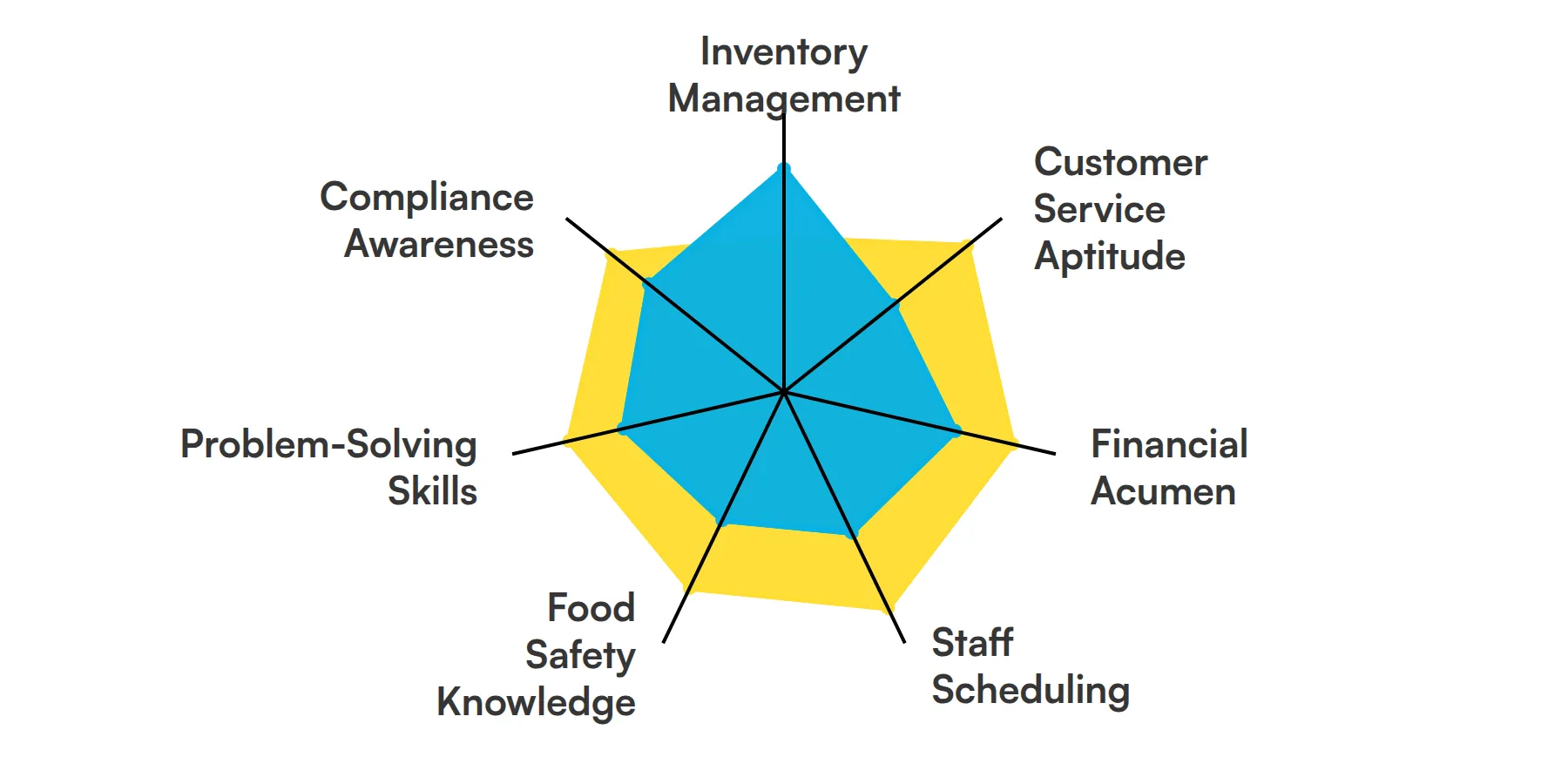
Inventory Management
Handling inventory is crucial to a restaurant manager's daily tasks. It involves ordering supplies and ensuring optimal stock levels to prevent shortages or surplus, both of which can affect costs and service quality. A manager needs to know what and when to order, keeping the kitchen running smoothly without waste.
For more insights, check out our guide to writing a Supply Chain Manager Job Description.
Customer Service Aptitude
Customer service can make or break a restaurant experience. A restaurant manager needs to address complaints, answer questions, and create a welcoming atmosphere. It's about turning a first-time visitor into a regular customer by ensuring satisfaction at every stage of their visit.
Financial Acumen
Managing the finances involves budgeting, forecasting, and cost control. The restaurant manager analyzes financial statements to improve profitability. Keeping an eye on sales trends and adjusting expenses appropriately ensures the restaurant remains financially healthy.
Check out our guide for a comprehensive list of interview questions.
Staff Scheduling
Creating effective schedules is part of maintaining at-peak service levels without overworking employees. A restaurant manager must balance staff availability with expected customer flow, ensuring the right number of employees on shift, all while considering labor laws and employee preferences.
Food Safety Knowledge
Maintaining food quality and safety standards is paramount to a restaurant's reputation. The manager ensures compliance with health regulations, conducts regular safety checks, and trains staff properly. This prevents potential health hazards and upholds the restaurant's image.
For more insights, check out our guide to writing a Restaurant Manager Job Description.
Problem-Solving Skills
Unexpected issues arise daily in restaurants, from supply delays to customer complaints. A restaurant manager should think on their feet and implement quick solutions to mitigate any disruption in service, ensuring operations are smooth while keeping customers and staff content.
Compliance Awareness
Running a restaurant means navigating various legal requirements. The manager ensures adherence to local laws, such as zoning, health, and employment regulations. Keeping the restaurant compliant avoids hefty fines and maintains its good standing.
8 secondary Restaurant Manager skills and traits
The best skills for Restaurant Managers include Marketing Knowledge, Vendor Relations, Event Coordination, Menu Development, Team Development, Technology Adaptation, Conflict Resolution and Data Analysis.
Let’s dive into the details by examining the 8 secondary skills of a Restaurant Manager.
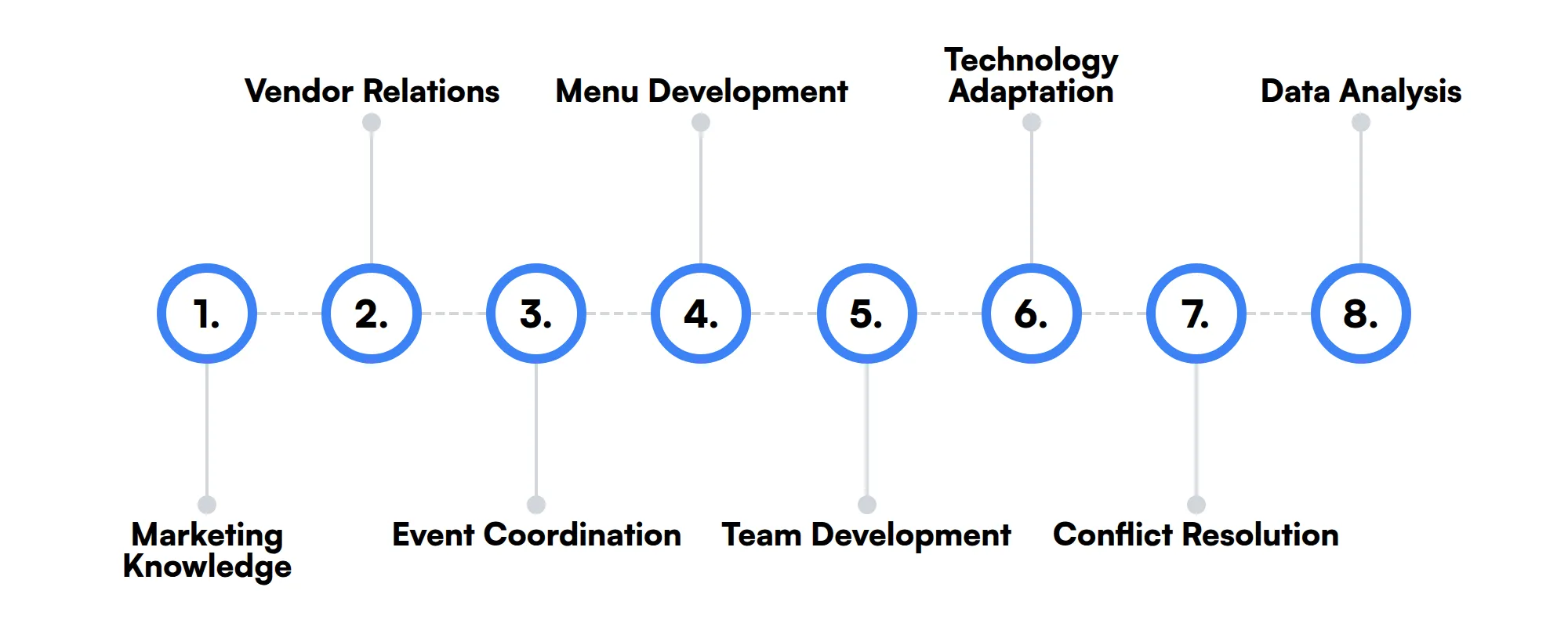
Marketing Knowledge
Promoting the restaurant through social media and local events boosts visibility and attracts customers. The manager may oversee campaigns or collaborate with marketers to enhance the restaurant's image and reach.
Vendor Relations
Working effectively with vendors ensures that supplies are delivered on time and at an appropriate cost. Building strong relationships can lead to better prices and more consistent quality, which are crucial for operations.
Event Coordination
Coordinating events like group bookings or themed nights enhances customer engagement. The manager plans and executes events that align with the restaurant's brand, ensuring they meet both client expectations and operational capabilities.
Menu Development
Though often done with chefs, a manager takes part in menu planning. They consider cost-effectiveness and customer preferences to keep offerings attractive and profitable, ensuring the menu aligns with the restaurant’s vision.
Team Development
Fostering a strong team involves hiring, training, and mentoring staff. The restaurant manager plays a vital role in building a cohesive team capable of delivering excellent service consistently.
Technology Adaptation
Embracing the latest in restaurant technology, from reservation systems to point-of-sale upgrades, enhances efficiency. Staying updated with tech advancements helps streamline operations and improves the customer experience.
Conflict Resolution
Handling staff disagreements or customer complaints professionally protects the restaurant’s atmosphere. Effective conflict resolution ensures minor issues don't escalate and affect the team or customer experience.
Data Analysis
Interpreting sales reports and customer feedback helps in making informed decisions. Analyzing data provides insights into customer behavior and operational efficiencies, guiding strategy adjustments for better performance.
How to assess Restaurant Manager skills and traits
Assessing the skills and traits of a restaurant manager requires a keen understanding of the diverse competencies needed to run a successful dining establishment. From ensuring food safety to managing inventory and finances, a restaurant manager must be well-versed in a variety of areas. Identifying the right balance of customer service aptitude and problem-solving skills is key to finding a manager who can thrive in a dynamic and sometimes unpredictable environment.
To truly gauge a candidate's readiness, it's crucial to look beyond resumes and traditional interviews. Skills-based assessments provide a clearer picture of a candidate's capabilities, allowing you to see how they apply their knowledge in real-world scenarios. For instance, Adaface on-the-job skill tests can aid in streamlining the hiring process by reducing screening time by 85%, enabling you to focus on high-quality candidates.
Let’s look at how to assess Restaurant Manager skills with these 5 talent assessments.
Supply Chain Fundamentals Test
Supply Chain Fundamentals Test evaluates a candidate's knowledge in managing supply chain operations. This includes logistics, inventory management, procurement, and demand planning.
The test assesses understanding in logistics and transportation, inventory management, demand planning, procurement and sourcing, and risk management. It also covers the integration of technology in supply chain operations and the role of sustainability.
Successful candidates demonstrate proficiency in supply chain analytics, supplier relationship management, and order fulfillment. They can handle warehouse management and apply sustainability practices in supply chains effectively.
Customer Service Aptitude Test
Customer Service Aptitude Test measures a candidate's capabilities in customer service, focusing on attention to detail, problem-solving, and verbal reasoning.
The test evaluates candidates' communication skills, logical reasoning, and ability to handle customer interactions. It also includes situational judgment to assess responses to customer service scenarios and numerical reasoning challenges.
High-scoring candidates show strong abstract reasoning and verbal skills. Their ability to analyze and respond to customer service issues and enhance customer satisfaction is well-reflected through the test.
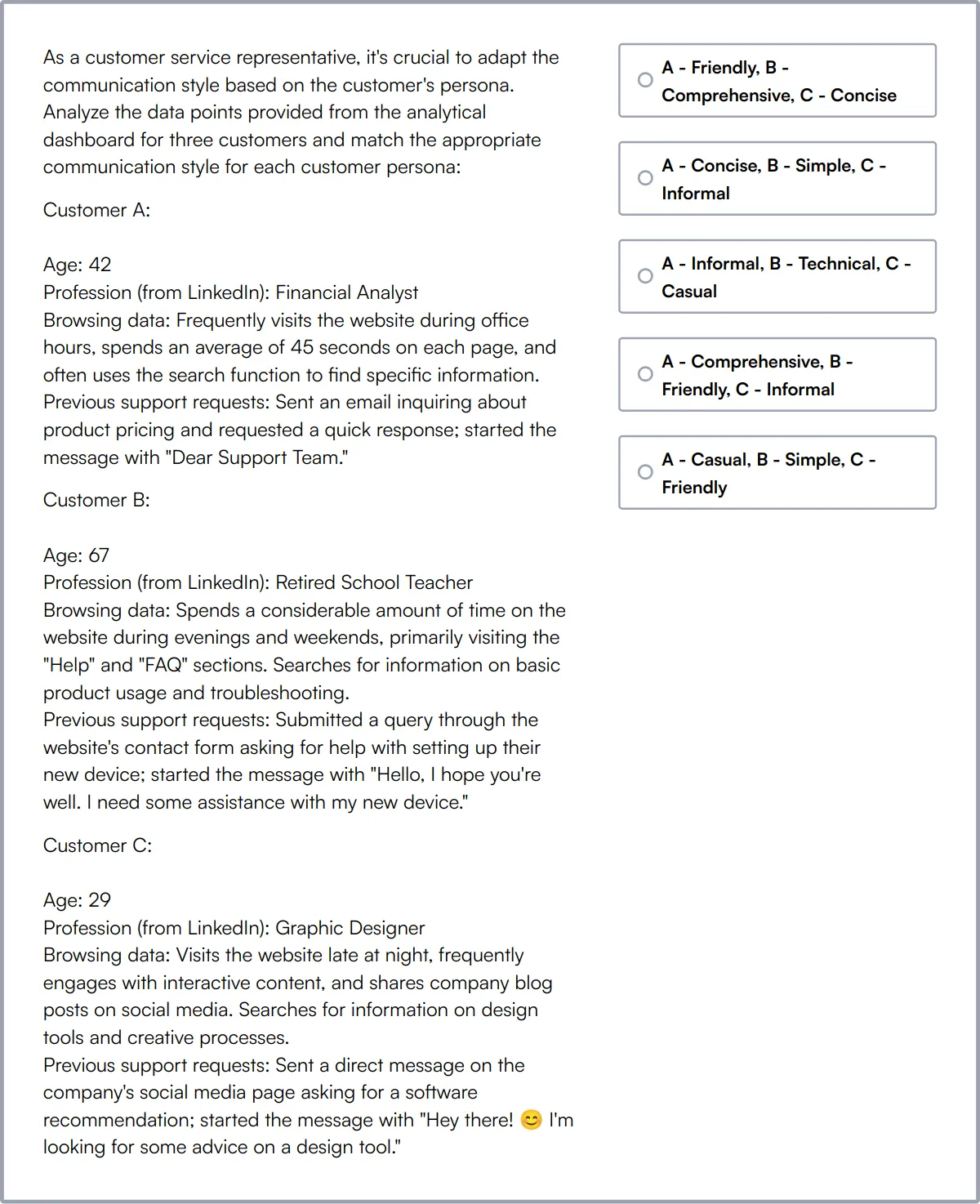
Financial Accounting Online Test
Financial Accounting Online Test assesses candidates' understanding of financial statements and accounting principles. Scenario-based MCQs evaluate skills in financial analysis and decision-making.
The test covers key areas like financial statements, double-entry bookkeeping, income and expense recognition, and asset and liability management. Candidates are also assessed on financial ratios, cash flow statements, and financial analysis capabilities.
Candidates who perform well demonstrate an ability to interpret financial data accurately and communicate information effectively to stakeholders. Their understanding of accounting standards and proficiency in financial software is noteworthy.
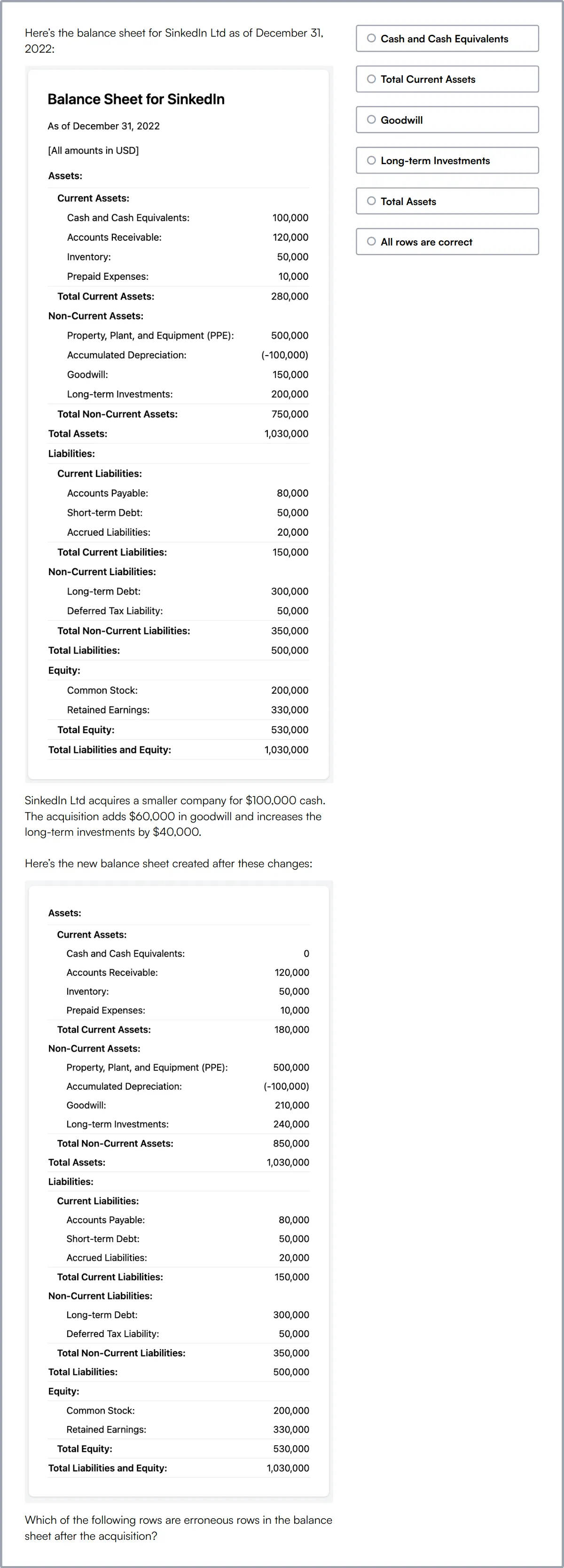
Hospitality (Including Restaurant) Test
Hospitality (Including Restaurant) Test evaluates competencies in customer service, restaurant operations, and hospitality management principles.
This test measures skills in areas such as menu planning, health and safety standards, and customer interaction. Additionally, it covers event planning, dining etiquette, and cost control measures applicable to restaurant settings.
Candidates who excel demonstrate leadership in hospitality and a solid grasp of culinary fundamentals. Their ability to manage hospitality environments and implement marketing strategies effectively is highlighted.
Problem Solving Test
Problem Solving Test evaluates a candidate's problem-solving abilities, focusing on abstract reasoning, critical thinking, and deductive reasoning.
The test assesses skills in data interpretation, spatial reasoning, and pattern matching. Candidates are challenged to apply logical reasoning to complex problems and identify solutions using varied reasoning strategies.
Candidates who score well show impressive learning agility and the ability to adapt to new challenges. Their critical thinking capabilities and ability to derive solutions in complex scenarios are well-reflected.
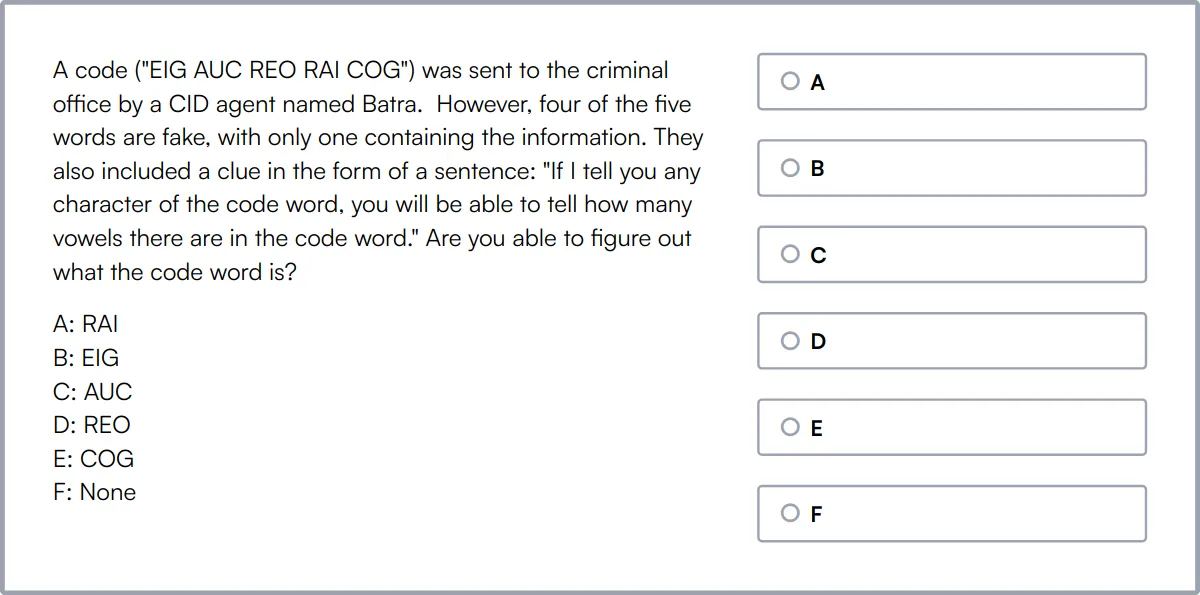
Summary: The 7 key Restaurant Manager skills and how to test for them
| Restaurant Manager skill | How to assess them |
|---|---|
| 1. Inventory Management | Evaluate capability in maintaining optimal stock levels and tracking supplies. |
| 2. Customer Service Aptitude | Assess ability to enhance guest satisfaction and handle inquiries. |
| 3. Financial Acumen | Review understanding of budgeting, forecasting, and financial reporting. |
| 4. Staff Scheduling | Check proficiency in creating efficient and fair staff schedules. |
| 5. Food Safety Knowledge | Determine understanding of health regulations and sanitary practices. |
| 6. Problem-Solving Skills | Measure aptitude in identifying issues and implementing effective solutions. |
| 7. Compliance Awareness | Verify knowledge of industry regulations and legal requirements. |
Hospitality (Including Restaurant) Test
Restaurant Manager skills FAQs
How can I assess a candidate's inventory management skills?
Ask candidates to describe their approach to maintaining stock levels and reducing waste. Inquire about specific software they use or systems they've implemented for tracking inventory.
What questions can reveal a candidate's customer service aptitude?
Ask about past experiences handling difficult customers and how they ensured customer satisfaction. Role-playing a customer service scenario can also be insightful.
How do I evaluate a restaurant manager's financial acumen?
Request examples of how they have managed budgets, analyzed financial reports, or increased profitability. Test their understanding of key financial metrics like COGS and profit margins.
What methods can test a candidate's staff scheduling prowess?
Inquire about their experience with scheduling software and how they've optimized workforce distribution during peak and off-peak hours.
How is a candidate's knowledge of food safety best assessed?
Evaluate their understanding of regulations such as HACCP and have them explain procedures they use to ensure compliance with health standards.
What indicators show a candidate's problem-solving skills?
Ask candidates to recount instances where they addressed unexpected challenges in the restaurant, focusing on their thought process and outcome.
How do you determine a candidate's capability in data analysis?
Discuss specific examples where they used data to drive decision-making, such as sales trends or customer feedback analysis, and the results of those decisions.
What questions assess vendor relations expertise?
Inquire about their experience negotiating contracts with suppliers and managing vendor performance. Look for evidence of building strong, beneficial relationships.

40 min skill tests.
No trick questions.
Accurate shortlisting.
We make it easy for you to find the best candidates in your pipeline with a 40 min skills test.
Try for freeRelated posts
Free resources



